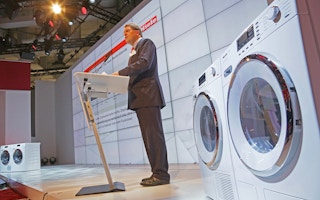Global premium appliance firm Miele has just unveiled a solar tumble dryer that is good for the clothes and the environment.
To continue reading, subscribe to Eco‑Business.
There's something for everyone. We offer a range of subscription plans.
- Access our stories and receive our Insights Weekly newsletter with the free EB Member plan.
- Unlock unlimited access to our content and archive with EB Circle.
- Publish your content with EB Premium.
Called the T 8881 S EcoComfort, the dryer was launched at IFA 2013 or the trade show in Berlin where international electronics and home appliances brands showcase their latest innovations, which will open on Friday.
“
Residential clothes dryers in the US use around 43 billion kilowatt hours of electricity, which amounts to 32 million metric tonnes of carbon dioxide emissions
US Environmental Protection Agency
Miele, a German manufacturer, initially introduced the concept of an energy-efficient solar-powered dryer back in 2011 at the same trade event with partner Solvis, a solar-thermal specialist. The idea is to harness energy from the sun using solar-thermal rooftop arrays that will channel the heat to a closed system of pipes and a water storage tank, resulting to loss of moisture in the clothes. With this energy exchange, the dryer could cut the operating costs of a heat pump dryer in half.
According to the Energy Information Agency (EIA), clothes dryers account for more than four per cent of energy use in residences in the United States. In addition, residential clothes dryers in the US use around 43 billion kilowatt hours of electricity, said the Environmental Protection Agency (EPA), which amounts to 32 million metric tonnes of carbon dioxide emissions.
However, these are conventional dryers, which usually work with a condenser that needs more energy to pass heat through the load, unlike the more advanced heat pump dryers in Europe that consume only about half the energy, according to a Forbes magazine article.
The EcoComfort dryer, on the other hand, is even more efficient. It uses less energy compared to a heat pump dryer by about 60 per cent or 80 per cent for a conventional dryer, said Miele. The solar dryer “reduces the burden on the environment” with an A+++ energy efficiency rating provided by the European Union, they added.
The solar dryer does not rely completely on the sun to operate. The EcoComfort works in tandem with a home’s central heating system, connected to a storage tank with four lines. Miele explained that the first line transfers the heated water – due to the solar-thermal array – to the dryer, where a heat exchanger processes it into hot air. Next, the cooled down water is returned to the storage tank through the second pipeline. The third line then supplies cooler water from the tank to the dryer to reduce the air’s heat.
This is followed by a further cooling via a second heat exchanger that channels the extracted moisture from the clothes through the fourth line. Miele said: “Thanks to this closed circuit, temperature losses are negligible as, for the most part, the heat extracted for drying laundry is re-introduced to the storage tank in the condensation process.”
According to the appliance company, this solar-powered system is also applicable to other Miele consumer products like their washing machines and dishwashers.
As for availability of solar energy during winter season, they said the water in the storage tank could be heated using geo-thermal heat or biomass, although no further details were provided.
There is also no price yet, but based on a four-member family’s normal dryer usage, the T 8881 S EcoComfort can be capitalised within seven years, said Miele.










